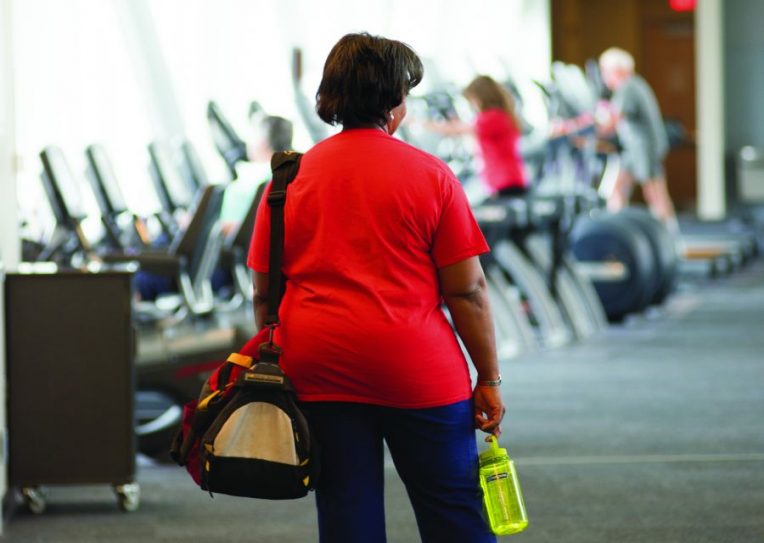Black women don’t jog along Lake Michigan, and gyms and treadmills are for skinny white women who eat grapes.
Elaine Hardy laughs when she talks about some of the impressions midlife African-American women have of exercise. The Mennonite College of Nursing assistant professor, a midlife African-American woman herself, has been researching whether racial identity is a predictor of physical activity in midlife black women.
The answer is yes.
“Race has a definite impact on whether women will be physically active or not,” Hardy, Ph.D., RN, said, after studying 252 women in Northwest Indiana and repeating the research with 70 women in Central Illinois. She found that African-American women are less active than white women, leading to a higher incidence of illness and death related to chronic disease.
Hardy used two measures of physical activity: the Jackson Heart Study physical activity survey, which measures moderate and vigorous activity, and the Behavioral Risk Factor Surveillance System, which examines the number of hours engaged in activity. The women were between the ages of 40 and 65.
When Hardy chose this topic for her dissertation at the University of Illinois at Chicago, it was a bit of a battle to convince anyone race could be a factor. She was paired with an advisor who had researched midlife exercise in all women, without race being a variable.
Hardy joined Illinois State University in 2012. Last year, she received a University Research grant to expand her study to African-American women in Central Illinois. She’s still analyzing that data.
Her research looks at how the women view exercise and what would motivate them to become more active. She looked at variables known to influence activity, from body mass index and chronic health conditions to social support, environment, and self-efficacy, or the belief that you can do the activity.
Believing you can do it isn’t always enough, she found.
If you say ‘exercise’ to black women, they have a preconceived notion that you have to join a gym, dress in a certain way, and have to be there so many times in a week.
Earlier in her career as a clinical nurse specialist, she counseled diabetics on how diet and exercise could help them manage their disease. She recruited them for a walking program but found they would stop exercising when the program ended.
“Sometimes they’d rather take a pill than exercise,” Hardy said. “And diabetes doesn’t hurt. Hypertension doesn’t hurt. But it’s what kills you.”
Women in midlife often have less time to exercise because of families and careers, and they may be discouraged by the amount of weight they need to lose, she said.
“Exercise for adults is so much harder because we’re in a routine, we don’t see the benefit, we don’t see the need,” she said. “And you don’t lose 30 pounds overnight; it’s such a long process.”
The former high school athlete, who laughs when she says she has a gym membership, could relate to why the women stopped exercising: “Here I am looking like the rest of the women in the room. I need to exercise.”
Hardy found the women were stuck on the word “exercise.”
Just the word exercise was a big thing,” she said. “If you say ‘exercise’ to black women, they have a preconceived notion that you have to join a gym, dress in a certain way, and have to be there so many times in a week. It’s not the person walking around the track: That’s not what they consider exercise.”
The majority of those in her initial study were from the Chicago area. Going to the gym meant taking public transportation. Walking in their neighborhoods wasn’t always safe. She decided to stop using the word exercise and instead encouraged the women to become active, telling them that yard work, laundry, playing with the kids, and taking the stairs counted.
“We define fitness by whether you are able to do the things you need to do in the course of the day,” she said.
When it comes to ideal weight, she found cultural differences; there’s an acceptance of “curves” among black women. “For black women, shape and weight is not always the same thing as it is for white women,” Hardy said. “It’s how their clothes fit, how they see themselves. They’re not obsessed with the scale.”
Also, food is central to social events in the African-American culture. “Everything is around the kitchen, even if it’s a death. Everything has to have food and high-fat foods, but some of that is changing,” Hardy said.
Hardy would like to bring the women back for focus groups, asking what would motivate them and exploring whether guilt for taking the time for exercise could be holding them back.
“Some of the literature says black women feel guilty when they take time for themselves and I don’t know if that’s changing,” she said.
Hardy hopes to duplicate her research in different geographical areas of the U.S., comparing her findings and designing a “racially sensitive intervention” for the women.
“I don’t like going into a community, doing the research, and telling people what they should be doing,” Hardy said. “I’d like to find out what they would engage in.”
She also wants health care workers and nutritionists to become aware that racial identity can be a factor in unhealthy behavior: “We have to keep in mind that culture and racial identity are as important as age and gender in finding a motivation that works.”
Read Hardy’s original study.

